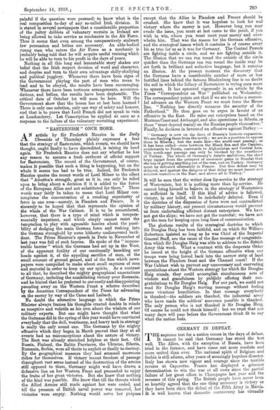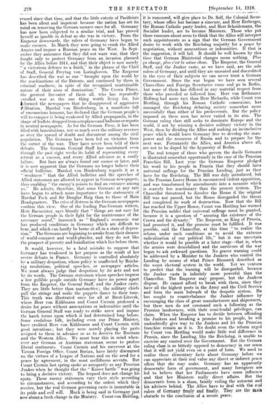GERMANY IN DEFEAT. T HE supreme test for a nation comes
in the days of defeat. It cannot be said that Germany has stood the test well, The Allies, with the exception of Russia, have been tried in the furnace, and have come out more resolute and more united than ever. The national spirit of Belgium and Serbia is still aflame, after years of seemingly hopeless disaster. Italy has shown new vigour and courage since the terrible reverse at Caporetto. France has displayed a grimmer determination to win the war at all costs since the partial failure of her great effort in Champagne last year and the reverses of this spring. The British people have never been so heartily agreed that the one thing necessary is victory as they have been since the defeat of the Fifth Army in March. It is well known that domestic controversy has virtually ceased since that time, and that the little coterie of Pacificists has been silent and impotent because the nation has set its mind on removing the German menace once for all. Germany has now been subjected to a similar trial, and has proved herself as ignoble in defeat as she was in victory. From the Emperor downwards, the rulers of Germany have begun to make excuses. In March they were going to crush the Allied Armies and impose a Russian peace on the West. In Sept- ember they announce that they did not want war, that they fought only to protect Germany from an invasion planned by the Allies before 1914, and that their object is now merely " a victorious defence to a finish," in the phrase of the Chief of Staff, General Freytag von Loringhoven. The Emperor has described the war as one " brought upon the world by the machinations of the Entente, and continued by them in criminal madness, in spite of the recognized unattainable nature of their aims of domination." The Crown Prince, the greatest fire-eater of them all, who has repeatedly extolled war as the one thing worth living for, has if formed the newspapers that he disapproved of aggressive 0.ilitarism. Marshal von Hindenburg, in a manifesto full of unconscious humour, has declared that the German people's will to conquer is being weakened by Allied propaganda, in the shape of leaflets dropped from aeroplanes and balloons or reports in neutral newspapers. As for the German Press, it has been filled with lamentations, not so much over the military reverses as over the spread of doubt and discontent among the civil population. The Germans have been fed on victories from the outset of the war. They have never been told of their defeats. The German General Staff has maintained even through the past eight weeks its habit of representing every retreat as a success, and every Allied advance as a costly failure. But liars are always found out sooner or later, and it is now apparent that the Germans no longer believe their official bulletins. Marshal von Hindenburg regards it as a weakness " that the Allied bulletins and the speeches of Allied statesmen are allowed to appear in German newspapers, thus enabling " the enemy's poison to find an entrance among us." He admits, therefore, that some Germans at any rate have begun to attach more importance to the statements of Marshal Foch and Sir Douglas Haig than to those of Main Headquarters. The cries of distress in the German newspapers confirm this view. One of the leading Pan-German writers, Herr Bacmeister, says bluntly that " things are not easy for the German people in their fight for the maintenance of the necessary moral," inasmuch as " England's economic war has produced conditions in Germany which are difficult to bear, and which can hardly be borne at all in a state of depres- sion." The Germans are beginning to awake from their dreams of world-conquest and world-plunder, and they do not like the prospect of poverty and humiliation which lies before them.
It would, however, be a fatal mistake to suppose that Germany has weakened in her purpose as the result of her severe defeats in France. Germany is controlled absolutely by a military despotism, whose policy is unaffected by Reichs- tag resolutions, political speeches, or newspaper articles. We must always judge that despotism by its acts and not by its words. The German statesmen whose speeches impress a few gullible people outside Germany have no power apart from the Emperor, the General Staff, and the Junker caste. They are little better than marionettes ; • the military chiefs pull the strings and make the puppets dance to their tune. This truth was illustrated once for all at Brest-Litovsk, where Herr von Kuhlmann and Count Czernin professed a desire for peace without annexations or indemnities until the German General Staff was ready to strike anew and impose the harsh terms upon which it had determined long before. Some credulous folk, including even our Prime Minister, have credited Herr von Kuhlmann and Count Czernin with good intentions ; but they were merely playing the parts assigned to them in advance so as to deceive the Russians and the Western Allies. We must bear this in mind when- ever any German or Austrian statesman seems to profess liberal sentiments. Count Czernin and his successor at the Vienna Foreign Office, Count Burian, have lately discoursed on the virtues of a League of Nations and on the need for a peace by agreement, in the most mellifluous accents. But Count Czernin last spring spoke as arrogantly as any Prussian Junker when he thought that the " Kaiser battle " was going to bring a decisive victory. The leopard does not change his spots. These enemy statesmen vary their style according to circumstances, and according to the orders which they receive, but the real German governing caste is immutable in its pride and evil will. Much is being said in Germany just now about a fresh change in the Ministry. Count von Herding, it is rumoured, will give place to Dr. Solf, the Colonial Secre- tary, whose office has become a sinecure, and Herr Erzberger, the Roman Catholic party leader, and Herr Scheidemann, the Socialist leader, are to become Ministers. Those who put these rumours about seem to think that the Allies will interpret such appointments as a sign that the German Government desire to work with the Reichstag majority for a peace by negotiation, without annexations or indemnities. If that is the suggestion, it will fail. It should be well known by this time that German Ministerial changes mean nothing. Plus ca change, plus c'est la mime chose. The Emperor, the General Staff, and the Junker caste, as we have said, are the sole rulers of Germany, and until they are unseated and discredited in the eyes of their subjects we can never trust a German Government. Since the war began we have seen several Chancellors and Foreign Secretaries conic and go in Berlin, but none of them has differed in any material respect from those who preceded or followed him. Herr von Bethmann Hollweg had more tact than Herr Michaelis, while Count von Herding, through his Roman Catholic connexions, has managed the Reichstag debating society somewhat more successfully than either of his predecessors. But the policy imposed on these men has never varied in its aim. The German ruling class still seeks to dominate Europe and the world, if not by winning a decisive military victory in the West, then by dividing the Allies and making an inconclusive peace which would leave Germany free to develop the man- power and the resources of Russia and to prepare for the next war. Fortunately the Allies, and America above all, are not to be duped by the hypocrisy of Berlin.
The real temper of those who govern the docile Germans is illustrated somewhat opportunely in the case of the Prussian Franchise Bill. Last year the German Emperor pledged his word to his people in Prussia that they should have universal suffrage for the Prussian Landtag, just as they have for the Reichstag: The Bill was duly introduced, but in the Prussian Lower House it encountered violent opposition, and was transformed by amendments into a measure which is scarcely less reactionary than the present system. The Chancellor threatened to dissolve the House if the original Bill was not passed, but the House disregarded the threat and completed its work of destruction. Now that the Bill has reached the Upper House, Count von Herding has warned the Prussian nobles that universal suffrage must be granted, because it is a question of " assuring the existence of the Crown and the dynasty." The Emperor, as King of Prussia, had promised it, and the promise must be fulfilled. It was possible, said the Chancellor, at this time " to realize the reform under such conditions as to avoid the extreme radicalization of our political life," but it was uncertain whether it would be possible at a later stage—that is, when the armies were demobilized and the survivors of the war began to ask awkward questions. No graver warning could be addressed by a Minister to the Junkers who control the Landtag by means of what Prince Bismarck described as the worst electoral system in the world. Yet we venture to predict that the warning will be disregarded, because the Junker caste is infinitely more powerful than the Chancellor. The Emperor may propose, but the Junkers dispose. He cannot afford to break. with them, since they have all the highest posts in the Army and the Civil Service and form the main bulwark of the despotic system. He has sought to counterbalance the Junker influence by encouraging the class of great manufacturers and shipowners, but these men do not command such a following as the Prussian landowners, with their semi-feudal privileges, can claim. When the Emperor has to decide between offending the Junkers and breaking a promise to his people, he will undoubtedly give way to the Junkers and let the Prussian franchise remain as it is. No doubt even the reform urged by Count von Herding would make little real difference in Prussia, since the Landtag, like the Reichstag, is unable to exercise any control over the Government. But the German ruling class is so bitterly opposed to democracy in our sense that it will not yield even on a point of form. We need to realize these elementary facts about Germany before we can appreciate at their real value any direct or indirect peace offers that she may make. Germany has an apparently democratic form of government, and many foreigners are led to believe that her Parliaments have some influence and that her Ministers really direct affairs. But the democratic form is a sham, faintly veiling the autocrat and his advisers behind. The Allies have to deal with the nal rulers of Germany firmly and finally. They are the main obstacle to the conclusion of a secure peace.



























 Previous page
Previous page